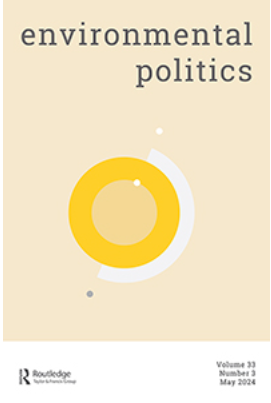美国的能源赌博:人、经济和地球
IF 5.2
1区 社会学
Q1 ENVIRONMENTAL STUDIES
引用次数: 0
摘要
气候行动的障碍值得深入讨论。文化和民间社会是巩固和挑战葛兰西框架内霸权的关键舞台。这本书讨论了小说、电影和电视中的气候表征,但批评它们是“气候奇观”,强化了痛苦和怜悯的被动政治,代表了一种矛盾地维持化石燃料霸权的“灾难资本主义”形式。这本书声称,世界末日的描述提供了一种“异想天开的消遣,没有认真挑战甚至承认我们当前政治和经济秩序的灾难性必然性”(第143页)。当作者提到偏远岛屿上的土著文物是颠覆性的文本时,他们可能也过于乐观。对气候表征的文化政治进行更微妙的讨论,可能会表明它们如何提高意识,或许还能刺激行动。本书的最后几章以葛兰西对政治危机的分析为基础,描述了新形式的激进主义的出现和潜在的未来。政治生态学家还认为,我们对自然的体验可以促进更根本的改变,利用葛兰西的见解,即人类意识和“常识”是通过与日常物质和自然世界的互动而形成的。当我们直接或通过媒体承受越来越大的气候压力时,这本书提供了智力指导,帮助我们理解气候风险所体现的更广泛的系统;用葛兰西的话来说,清楚地看到这场危机,“没有幻想,但不会幻灭”,可以推动反霸权组织,使人类走上更有希望的轨道。本文章由计算机程序翻译,如有差异,请以英文原文为准。
America’s energy gamble: people, economy and planet
hurdles to climate action deserve a deeper discussion. Culture and civil society are critical arenas for cementing as well as challenging hegemony in the Gramscian framework. The book discusses climate representations in novels, films and television, but critiques them as ‘climate spectacle’ that reinforces a passive politics of suffering and pity, representing a form of ‘disaster capitalism’ that paradoxically sustains fossil fuel hegemony. The book claims that apocalyptic portrayals provide a ‘fanciful diversion that fails to seriously challenge or even acknowledge the cataclysmic inevitability of our current political and economic order’ (p.143). The authors also perhaps indulge in over-optimism when they mention indigenous artifacts on remote islands as subversive texts. A more subtle discussion of the cultural politics of climate representations might suggest how they also raise awareness and perhaps stimulate action. The final chapters of the book describe the emergence of new forms of activism and potential futures, leaning on Gramsci’s analysis of political crises. Political ecologists have also argued that our experiences of nature could facilitate more fundamental change, leveraging Gramsci’s insight that human consciousness and ‘common sense’ are forged through interactions with the everyday material and natural worlds. As we endure increasing climate stresses, both directly and through the media, this book provides the intellectual guidance to help us make sense of the wider system in which climate risks are manifesting; seeing the crisis clearly, ‘without illusions but without becoming disillusioned’, in Gramsci’s words, could drive the counter-hegemonic organizing needed to put humanity on a more hopeful trajectory.
求助全文
通过发布文献求助,成功后即可免费获取论文全文。
去求助
来源期刊

Environmental Politics
Multiple-
CiteScore
11.70
自引率
5.50%
发文量
60
期刊介绍:
Environmental Politics is concerned with four aspects of the study of environmental politics, with a primary, though not exclusive, focus on the industrialised countries. First, it examines the evolution of environmental movements and parties. Second it provides analysis of the making and implementation of public policy in the area of the environment at international, national and local levels. Third, it carries comment on ideas generated by the various environmental movements and organisations, and by individual theorists. Fourth, it aims to cover the international environmental issues which are of increasing salience.
 求助内容:
求助内容: 应助结果提醒方式:
应助结果提醒方式:


